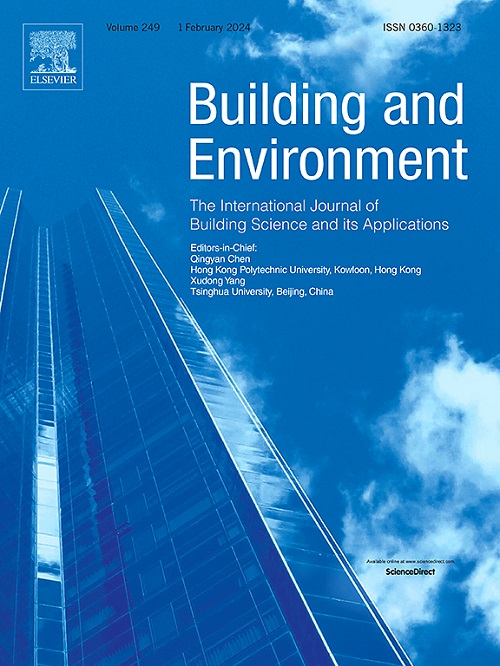Assessment of dust endotoxins, airborne bacteria, and PM2.5 at old-age nursing homes and children's daycare centers in the Seoul metropolitan area, South Korea
IF 7.1
1区 工程技术
Q1 CONSTRUCTION & BUILDING TECHNOLOGY
引用次数: 0
Abstract
Indoor air pollutants are associated with adverse health effects in people, particularly children and older adults—the most vulnerable groups health-wise who also happen to spend much of their time in indoor environments. To contribute to knowledge on how these groups can be protected, this study sought to determine the relationships between indoor pollutants (dust endotoxins, airborne bacteria (AB), and particulate matter (PM2.5)) and environmental factors (temperature, relative humidity (RH), use of air conditioners (AC), use of windows, and season). For each pollutant, 360 samples were collected from 31 old-age nursing homes and 31 daycare centers in South Korea. The Mann–Whitney U test, Kruskal–Wallis rank sum, Spearman's rank analysis, and multivariate regression were used to determine whether there were significant differences between indoor pollutants and environmental factors. Dust endotoxin values ranged between < LOD and 632 EU/mL and between 306 and 632 CFU/m3 for AB, and ranged from 3.9 to 32.5 µg/m3 for PM2.5. Dust endotoxin levels showed a significant relationship with RH and season in the multiple regression analysis. Periodic AC filter cleaning and exchange, as well as proper RH management in these facilities may help reduce indoor biological pollutants. The findings of this study are informative for addressing the respiratory health issues of older people and children in indoor facilities.
韩国首尔市区养老院和儿童日托中心的粉尘内毒素、空气中的细菌和 PM2.5 评估
室内空气污染物与人们的不良健康影响有关,尤其是儿童和老年人--他们是健康方面最脆弱的群体,而且大部分时间都在室内环境中度过。为了帮助人们了解如何保护这些群体,本研究试图确定室内污染物(灰尘内毒素、空气传播细菌 (AB) 和颗粒物 (PM2.5))与环境因素(温度、相对湿度 (RH)、空调使用情况、窗户使用情况和季节)之间的关系。针对每种污染物,研究人员从韩国 31 家养老院和 31 家日托中心收集了 360 份样本。采用曼-惠特尼 U 检验、Kruskal-Wallis 秩和检验、斯皮尔曼秩分析和多元回归检验来确定室内污染物与环境因素之间是否存在显著差异。灰尘内毒素值介于< LOD和632 EU/mL之间,AB介于306和632 CFU/m3之间,PM2.5介于3.9至32.5 µg/m3之间。在多元回归分析中,粉尘内毒素水平与相对湿度和季节有显著关系。在这些设施中定期清洗和更换空调过滤器,以及进行适当的相对湿度管理,可能有助于减少室内生物污染物。这项研究的结果对于解决室内设施中老年人和儿童的呼吸健康问题具有参考价值。
本文章由计算机程序翻译,如有差异,请以英文原文为准。
求助全文
约1分钟内获得全文
求助全文
来源期刊

Building and Environment
工程技术-工程:环境
CiteScore
12.50
自引率
23.00%
发文量
1130
审稿时长
27 days
期刊介绍:
Building and Environment, an international journal, is dedicated to publishing original research papers, comprehensive review articles, editorials, and short communications in the fields of building science, urban physics, and human interaction with the indoor and outdoor built environment. The journal emphasizes innovative technologies and knowledge verified through measurement and analysis. It covers environmental performance across various spatial scales, from cities and communities to buildings and systems, fostering collaborative, multi-disciplinary research with broader significance.
 求助内容:
求助内容: 应助结果提醒方式:
应助结果提醒方式:


